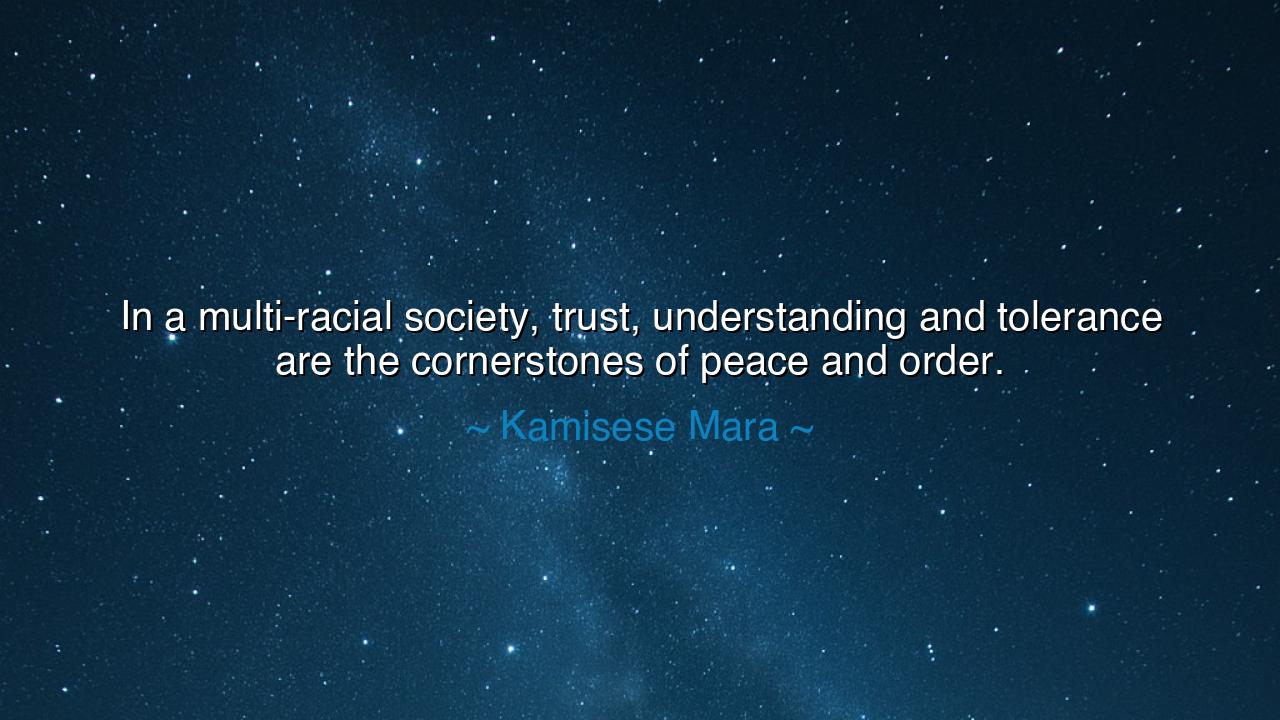
In a multi-racial society, trust, understanding and tolerance are
In a multi-racial society, trust, understanding and tolerance are the cornerstones of peace and order.






Hear the words of Kamisese Mara, the founding father of Fiji, who guided his island nation through the storms of independence and division. He declared: “In a multi-racial society, trust, understanding and tolerance are the cornerstones of peace and order.” These words are not the musings of a dreamer, but the hard-won wisdom of a leader who saw his people divided by heritage, language, and faith, and yet longed to weave them together into one enduring fabric.
A multi-racial society is like a woven mat, where threads of many colors lie side by side. Alone, each thread may be strong, but together they form something broader, greater, and more enduring. Yet if one thread despises another, if one color seeks to dominate, the mat unravels, and all are left in weakness. Thus Mara teaches us: trust, understanding, and tolerance are not luxuries but the very knots that bind the threads together, holding the pattern of civilization intact.
History bears witness to this truth. Recall the story of South Africa, torn for generations by apartheid. Division was enforced, suspicion was bred, and cruelty reigned where trust had been broken. Yet when the chains of apartheid fell, it was not vengeance but the vision of reconciliation—embodied by Nelson Mandela and Desmond Tutu—that gave the nation a chance at peace. The multi-racial society did not heal overnight, but by sowing understanding and demanding tolerance, South Africa found a path away from chaos toward fragile but enduring order.
But the opposite lesson is also clear. When trust is betrayed, when tolerance is denied, societies fracture. The Balkans in the 1990s were torn apart as ethnic groups turned against one another, ancient resentments inflamed, and cities burned. There, where understanding was abandoned, peace crumbled, and neighbor turned on neighbor. From that darkness, we learn that diversity without unity is not strength, but peril. It is only when difference is held with respect that harmony can endure.
The wisdom of Mara lies in seeing that peace is not the absence of conflict but the presence of balance. It is not enough to pass laws or build walls. Peace in a diverse society is born when one group does not fear another, when ears are opened to listen, when hearts are wide enough to hold difference without hatred. It is forged daily, in small acts: in the handshake across lines of culture, in the breaking of bread between neighbors, in the teaching of children to see humanity before race.
The lesson is clear for all who hear: to dwell in a multi-racial society is to live with both gift and burden. The gift is richness, wisdom from many streams, and beauty born of difference. The burden is responsibility—to cultivate trust, to seek understanding, to practice tolerance, even when it is hard. These are not weaknesses, but the virtues of the strong, for it is the weak who lash out in fear, and the wise who build peace.
Therefore, take this teaching into your own life: look upon those who are not like you, and seek to know them. Guard your words, so they do not wound. Build bridges, not walls. Teach your children that difference is not threat but treasure. And when anger rises, answer it not with hatred, but with the patience that gives space for peace to grow. In this way, you become a builder of order, a guardian of liberty, and a servant of truth.
So remember Mara’s wisdom: the survival of a multi-racial society is not secured by the might of armies nor the wealth of nations, but by the unseen strength of trust, understanding, and tolerance. These are the stones that hold up the temple of peace. If they are neglected, the temple falls. But if they are tended, it will stand for generations, a beacon to the world of what humanity can be when it chooses harmony over division.






AAdministratorAdministrator
Welcome, honored guests. Please leave a comment, we will respond soon